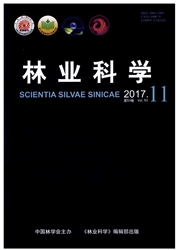

 中文摘要:
中文摘要:
本文利用嗅觉仪、GC/MS等测定技术,研究日本龟蜡蚧危害后,柿树和枣树对2种捕食性天敌昆虫中华草蛉和异色瓢虫的招引作用。结果表明:在日本龟蜡蚧1个年生活周期中的5—6月份和7—8月份2个阶段受害枝叶对天敌没有显著的招引作用,但在9—10月受害枝叶具有较强烈的招引作用并呈现出昼夜节律性;1:00-3:00和13:00—15:00 2个时段,2种寄主树木受害与未受害的枝叶招引效应之间的差异均达极显著水平,而在7:00-9:00和19:00—21:002时段内并没有表现出招引作用。同时受害枝叶对天敌的招引作用还表现为虫害诱导后树体挥发物和蚧虫的虫体挥发物的协同作用,但受害枝叶的招引力强于蚧虫虫体。与未受害相比,受害柿树挥发物中有6种物质含量明显增加,并新增加了11种组分,包括3种萜类、3种芳香类、3种烃类和2种醇类化合物。
 英文摘要:
英文摘要:
The olfactory tendency preference was studied on the two predatory natural enemies, agreen lacewing, Chrysopa sinica and a ladybird, Harmonia axyridis, being attracted to the two kinds of trees, Diospyros kaki and Ziziphusjujuba that were damaged by a scale insect, Ceroplastes japonicus. The results showed that during around a year in the two stages, from May to June and from July to August, the two kinds of damaged host trees did not show the significant attraction to the two natural enemy insects. However, in the time from September to October, the attractive action showed strongly with a nocturnal and diurnal rhythm. In the midnight from 1:00 to 3:00 and in the afternoon from 13:00 to 15:00, the attractive effects reached significantly different level. Contrastively no attractive action was detected in the other two phases respectively in the morning from 7:00 to 9: 00 and in the evening from 19:00 to 21:00. These effects as if related with the changes of temperature and humidity in one day. It was found that the source of volatile compounds come from the combination of the two host plants and Japanese wax scale, in which the former played the more important function than the later did. Compared with the volatile of undamaged persimmon, in the compositions of damaged persimmon trees, 6 components increased their contents, while 11 components appeared, including 3 kinds of terpenoids, 3 kinds of aromatic compounds, 3 kinds of hydrocarbons and 2 kinds of alcohols. Their function for attracting the predatory natural enemies was discussed.
 同期刊论文项目
同期刊论文项目
 同项目期刊论文
同项目期刊论文
 期刊信息
期刊信息
